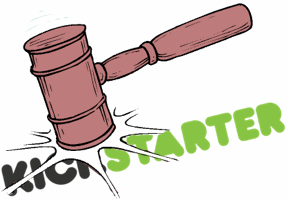Kickstarter, which just recently celebrated the 10,000th successfully funded project in its 2.5-year history, is under siege by that most ubiquitous of foes, presently at least: patent litigation.
Yes, the site that works so diligently to advance interesting and original ideas among the community is being shaken down by a company seemingly formed for patent-licensing purposes. But whether we like them or not isn’t material if the patent is valid and granted, right?
Here’s the patent: Methods and apparatuses for financing and marketing a creative work. The inventor is Brian Camelio, former studio musician for Journey (surely an albatross around his neck these days) and founder of ArtistShare, a perfectly legitimate and forward-thinking website which allows fans to “show appreciation for their favorite artists by funding their recording projects in exchange for access to the creative process, LTD Edition recordings, VIP access to recording sessions and even credit listing on the CD.” It’s been around for years and has Grammy-award winning artists on its rolls.
It’s an obvious application of the patent, which was filed for in 2003. And reading over the claims, it’s conceivable that it could apply to certain projects on Kickstarter. But like many other “method for” patents, it’s really just an existing business strategy in internet form. People have been collaborating on artistic projects in exchange for creative input for centuries. They use whatever tools they’ve got. The patent amounts to a website that accomplishes this, with almost no specificity as to why this invention is in need of patent protection. Most of the claims and requirements are required either for any collaborative system like this or for any website where media has to be served.
Nevertheless, Fan Funded LLC has endeavored to license its new patent to Kickstarter under threat of litigation for infringement, as PaidContent has noted. Seems a bit like patenting “a car, with wheels” and then suing everyone who uses wheels — though to their credit they did act quickly following the issuance of the patent. Naturally, Kickstarter has asked that the patent be invalidated, and failing that, that they be found not infringing.
As usual, an over-permissive patent office is to blame. Anyone “skilled in the art” would have dismissed this patent as failing to be non-obvious — or at least I would. We’ll update when more information is available.
Update: Kickstarter, it seems, has its own patents on this front. Here and here, a matching pair for patenting the Kickstarter system of “conditional investment.” The patents seem just about as ridiculous, but it’s one thing to have them, another to go around suing people. Thanks to James Crane-Baker for pointing these out.
Update 2: I neglected to check the current status of Kickstarter’s patents due to their (relative) youth; they are in fact abandoned after being rejected. Thanks to Mark Nowotarski for the update. I realize the original post appears a bit incomplete in retrospect, I’m going to do a little more due diligence next time!
